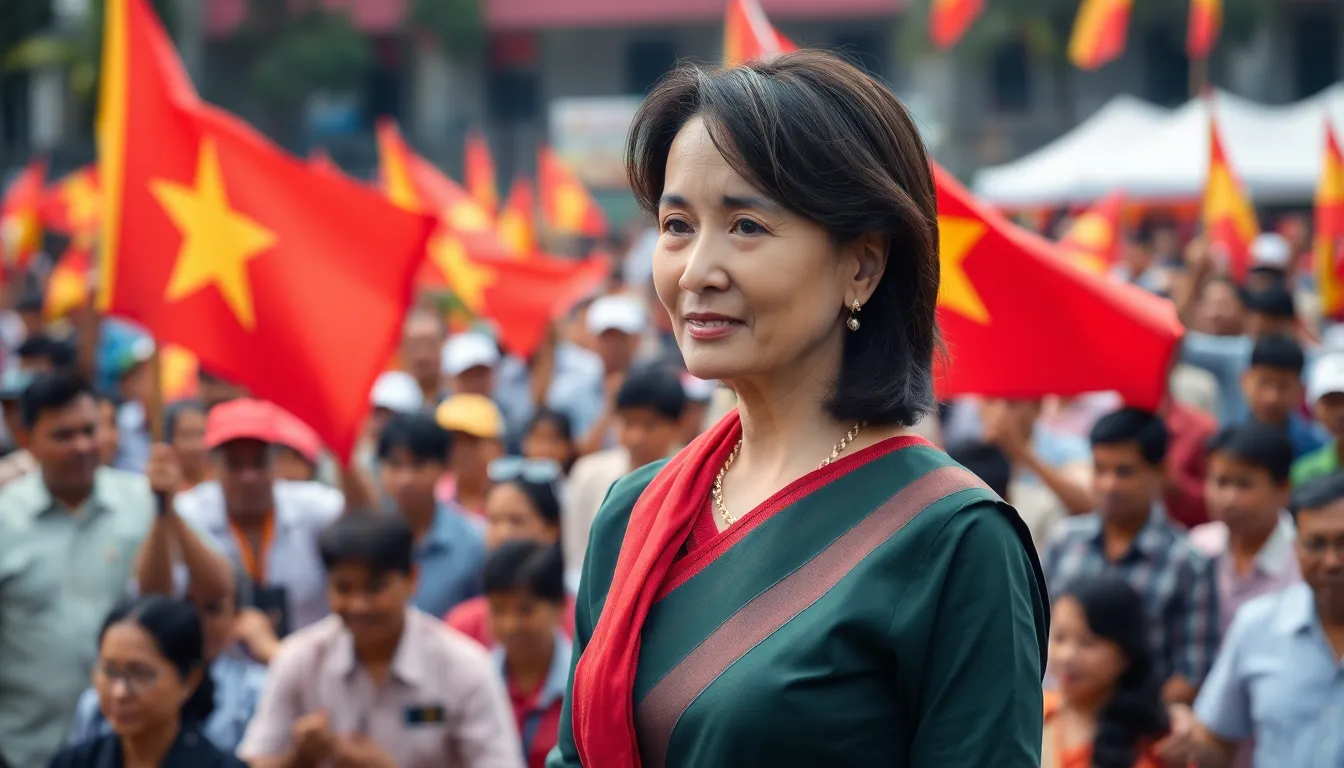Table of Contents
ToggleIn the heart of Southeast Asia lies Myanmar, a country rich in culture and history, but also a stage for political drama that could rival any soap opera. At the center of this unfolding story is the National League for Democracy (NLD), a party that’s been both a beacon of hope and a source of controversy. With its charismatic leader Aung San Suu Kyi once hailed as a symbol of resistance, the NLD’s journey has been anything but straightforward.
As Myanmar navigates the turbulent waters of democracy, the NLD’s role remains crucial. From election victories to military coups, this party has seen it all. Understanding the NLD is key to grasping the complexities of Myanmar’s political landscape, and trust us, it’s a wild ride worth taking. Buckle up as we explore the highs, lows, and everything in between of the NLD’s impact on Myanmar’s future.
Overview of NLD Myanmar
The National League for Democracy (NLD) represents a significant political force in Myanmar. Established in 1988, the NLD emerged as a response to the military junta’s oppressive regime. Its founding objective emphasized advocating for democracy and human rights in Myanmar. Aung San Suu Kyi, a prominent figure and Nobel Prize laureate, serves as the party’s leader, steering its mission toward national reconciliation and democratic reform.
In 2015, the NLD achieved a historic victory, winning 86% of the seats in the national parliament. This electoral success marked a crucial turning point, leading to the first civilian-led government in decades. However, the NLD’s governance faced numerous challenges, including ethnic conflicts and economic issues. Despite these hurdles, the NLD aimed to promote stability and development throughout the nation.
The military coup in February 2021 significantly impacted the NLD’s operations. Detaining Aung San Suu Kyi and other leaders, the military sought to regain control. Resistance from the NLD’s supporters manifested in widespread protests and acts of civil disobedience across the country. International condemnation of the coup underscored the global community’s support for Myanmar’s democratic trajectory.
The NLD’s ongoing struggle exemplifies the complex interplay between democracy and military rule. Their resilience reflects the aspirations of millions who advocate for a free and democratic Myanmar. The NLD’s historical significance and current challenges continue to shape the political landscape, underlining its role in the quest for democracy in Myanmar.
History of NLD Myanmar

The National League for Democracy (NLD) has played a critical role in Myanmar’s pursuit of democracy. Founded in 1988, the party emerged from resistance to an oppressive military junta, establishing a platform for advocating human rights and democratic reform.
Formation and Early Years
Formation of the NLD occurred in the wake of widespread pro-democracy protests. Aung San Suu Kyi became its prominent leader, guiding the party through its initial challenges. With a focus on national reconciliation, the party garnered significant grassroots support. Its early years involved mobilizing citizens disillusioned with military rule, ultimately laying the groundwork for future electoral engagement. By promoting democratic ideals, the NLD steadily built a dedicated following, embodying hope for a political transformation.
Major Political Milestones
The NLD’s major political milestones highlight its impact on Myanmar’s governance. In 2015, the party achieved a historic victory, securing 86% of parliamentary seats. This victory marked the first civilian-led government in decades, showcasing the people’s desire for change. The NLD’s policies focused on economic reform and national peace initiatives, bolstering its popularity. Subsequent challenges, such as the 2021 military coup, underscored the continuous struggle against authoritarianism. Despite these setbacks, the NLD’s foundation in civil society activism remains crucial for Myanmar’s ongoing push for democracy.
Current Political Landscape
Myanmar’s political landscape remains complicated and fluid, particularly regarding the National League for Democracy (NLD) and its ongoing challenges. The NLD emerged as a key player in transitioning Myanmar towards a more democratic system.
Role in Myanmar’s Government
The NLD holds a significant position in Myanmar’s government structure. Winning 86% of parliamentary seats in 2015 marked a historic shift toward civilian governance. Aung San Suu Kyi, as the party leader, steered efforts for democratic reforms, emphasizing economic development and peace negotiations. However, the military coup in February 2021 changed the dynamics, leading to the detention of key NLD leaders. This power struggle diminished the party’s governance role, raising questions about its future influence.
Recent Elections and Outcomes
Since the military coup, elections in Myanmar have faced serious challenges. The NLD has not participated in elections under the military-controlled regime, affecting the credibility of the electoral process. Military authorities organized a general election in 2021, but it encountered substantial international criticism for its legitimacy. Reports indicated vastly reduced voter turnout and increased suppression of political opposition. As a result, the NLD’s electoral prospects remain uncertain, reflecting the continuing struggle between democracy and military authority in Myanmar.
Impact on Myanmar Society
The NLD’s governance and subsequent events have significantly transformed Myanmar’s society. The effects resonate across economic, social, and political dimensions.
Economic Policies
Economic policies initiated by the NLD aimed at fostering growth and stability. Strategies such as investing in infrastructure and promoting private enterprise drove economic development. The NLD’s focus on reducing poverty also contributed to improved living standards for many citizens. Efforts to attract foreign investment played an essential role, with the country seeing a surge in economic partnerships. Stronger connections with international markets enhanced opportunities for local businesses. However, ongoing political turmoil and the military coup have disrupted economic progress, diminishing the positive impacts of these policies.
Social Reforms
Social reforms championed by the NLD sought to enhance education and healthcare access. Initiatives that promoted gender equality and women’s rights also gained traction, empowering marginalized groups. Civil society engagement grew as the NLD encouraged civic participation and advocacy. These changes fostered a greater awareness of human rights issues among citizens. Community-based programs supported ethnic reconciliation efforts, aiming to unite diverse groups within Myanmar. Despite these advancements, the military’s repression has eroded many social gains, stifling further reform and participation.
Challenges Faced by NLD Myanmar
The National League for Democracy (NLD) faces significant challenges that hinder its efforts toward achieving a democratic Myanmar. These challenges stem from a range of factors, including military relations and internal conflicts.
Military Relations
Military relations present a critical challenge for the NLD. The military’s influence remains strong despite the NLD’s electoral victories. Trust between the NLD and military officials has deteriorated, particularly after the February 2021 coup. The coup not only resulted in the detention of prominent NLD leaders but also instigated a violent crackdown on protests. International condemnation intensified, highlighting the military’s disregard for democratic principles. The ongoing struggle for power illustrates the arduous path toward reconciliation and democratic governance.
Internal Conflicts
Internal conflicts complicate the NLD’s political initiatives and unity. Ethnic tensions have persisted across various regions, impacting the NLD’s ability to promote national reconciliation. Diverse political aspirations within Myanmar further exacerbate these divisions. The NLD’s attempts at fostering inclusivity have encountered resistance from ethnic armed groups and rival political factions. Protests against military rule often face opposition from diverse groups seeking their representation. Coordinating a unified response to these challenges remains a significant hurdle for the NLD’s governance agenda.
The journey of the National League for Democracy in Myanmar reflects a profound struggle for freedom and democracy. Despite significant achievements in governance and social reform, the military coup has cast a shadow over the NLD’s future. The ongoing political turmoil continues to challenge the party’s resilience and its ability to advocate for the people’s rights.
As Myanmar navigates this complex landscape, the commitment to democratic ideals remains crucial. The NLD’s legacy and the aspirations of its supporters will play a vital role in shaping the country’s path forward. The quest for a stable and inclusive democracy in Myanmar is far from over, and the world watches closely as events unfold.




